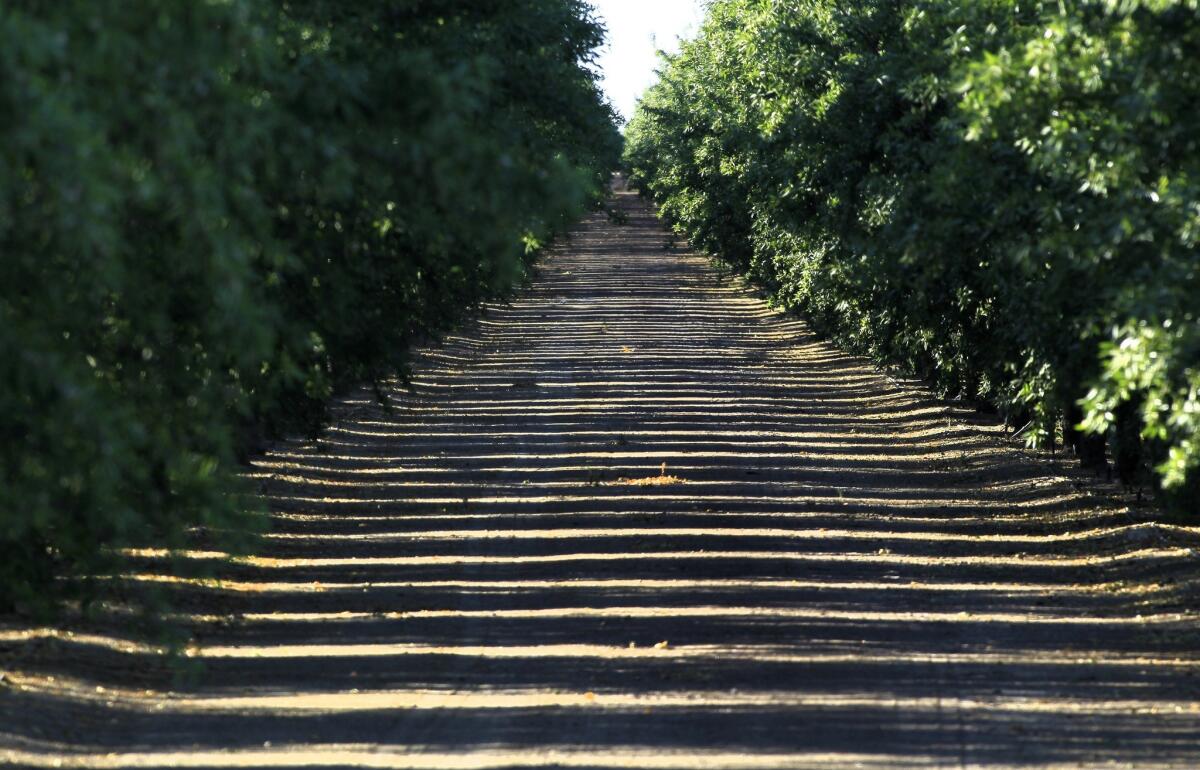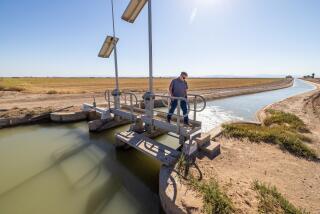Feds set to lock in huge water contract for well-connected Westlands Water District

- Share via
Westlands Water District, a sprawling San Joaquin Valley farm district with ties to the Trump administration, is poised to get a permanent entitlement to a massive quantity of cheap federal irrigation supplies.
Westlands is the first in line to permanently lock in its contract for Central Valley Project deliveries under a 2016 law. Other valley farm districts are expected to follow, but as the project’s biggest customer, Westlands arguably has the most to gain.
The deal would entitle Westlands to annual deliveries that are roughly double what the entire city of Los Angeles uses in a year.
There is no guarantee it will get that, since Westlands is low in the federal project’s pecking order and is among the first cut in times of shortage. Since 1990, it has received its full allotment in only four years.
But even partial deliveries result in huge quantities of water flowing from the ailing Sacramento-San Joaquin Delta to hundreds of thousands of district acres farmed by some of California’s wealthiest growers.
Long-term control would also allow Westlands to make lucrative water sales to thirsty cities and other agricultural agencies, although district officials say they have no intent to do so.
The prospect of Westlands having a permanent call on so much water — regardless of how many salted-up, badly drained acres the district may eventually take out of production or convert to solar farms — is reviving long-standing criticisms of its contract with the U.S. Bureau of Reclamation.
“What they’re doing is locking in on a seemingly permanent basis an inflated baseline for themselves at a time when we know they’re going to be irrigating less land in the future. It’s just hard to see how that’s in the public’s interest,” said Rep. Jared Huffman (D-San Rafael), who is demanding more contract details in his role as chairman of a House natural resources subcommittee.
Westlands has had water service contracts with the Central Valley Project since 1963. But they were subject to renewal, when the reclamation bureau could, at least in theory, renegotiate terms.
In contrast, the so-called repayment contract the bureau now proposes to award Westlands would not expire, permanently locking in the terms, including the amount of 1.15 million acre-feet of water.
Westlands asked for the new agreement under provisions of the 2016 WIIN Act, which opened the door for all reclamation contractors across the West to convert their water service contracts to permanent contracts if they repaid what they still owe federal taxpayers for construction of a federal water project.
In California, about 70 Central Valley Project contractors — most of them farm irrigation districts — have started negotiations to convert their contracts, according to the reclamation bureau, which oversees the vast irrigation project that greened the Central Valley with copious amounts of federally subsidized water deliveries.
Westlands is the first to complete the negotiations, and the reclamation bureau recently released the draft contract for public comment.
“It is very interesting that the one [district] who had hired Mr. Bernhardt is the first one through the chute,” said Patricia Schifferle of Pacific Advocates, an environmental group that scrutinizes Westlands dealings.
Before joining the Trump administration, Interior Secretary David Bernhardt was a partner in Brownstein Hyatt Farber Schreck, a top-grossing law and lobbying firm that represented Westlands. Bernhardt personally argued one appeals case challenging endangered species protections that were curbing delta deliveries to the district.
Schifferle complained that the reclamation bureau did not properly publicize release of the draft contract and has yet to disclose key terms, such as the amount of the construction debt Westlands will repay.
“The public now is given a 60-day time period to comment on a contract that they don’t have all the documents for. So to me not only is the contract suspect but the process is tainted,” she said.
In a letter to Westlands, the reclamation bureau last year estimated that the district owed the government $320.5 million as of June 2018. In an interview, Westlands general manager Tom Birmingham cited the same figure.
Michael Jackson, the reclamation manager who led the negotiations with Westlands, said his agency published notice of the draft contract in San Joaquin Valley newspapers. But in response to criticisms, the agency extended the deadline for public comment to Jan. 8, 2020.
The size of Westlands’ water contract has long been controversial in light of the soil problems that plague the 600,000-acre district. Much of it sits atop a clay layer, which prevents water from draining easily and concentrates toxic metals, including naturally occurring selenium.
In the early 1980s, wastewater from Westlands’ fields poisoned waterfowl at the Kesterson National Wildlife Refuge, setting off a long legal battle over its drainage.
In 2015 Westlands struck a settlement over drainage services that courts had ruled the federal government was legally obligated to provide.
Under the settlement, Westlands agreed to assume drainage responsibility, said it would permanently retire 100,000 acres of badly drained land and would also accept a 25% cut to its water contract.
In return, the government agreed to forgive Westlands’ construction debt — then roughly $350 million — and give the district a permanent contract for the reduced delivery amount.
But Congress never approved the settlement. And with Democrats in control of the House and Huffman in charge of a key water subcommittee, there is little or no chance it will be approved in the near future.
The new contract doesn’t include the water reduction. Nor does it contain provisions for reassessing delivery amounts if Westlands retires land on its own without a drainage settlement.
Even if Westlands were to eventually take half of the district out of irrigated agriculture, Jackson said, the district would retain the full delivery amount under the proposed contract. “I can’t think of anywhere it would be reassessed,” he said.
That, Huffman argued, leaves Westlands in permanent control of a big chunk of water that federal law allows it to sell to other irrigation districts or cities.
“They can just turn into a water bank and make a lot of money on this cheap public water,” he said.
Birmingham said that even if 200,000 acres went out of production, “there still would be a demand for in excess of 1.15 million acre-feet of water on an annual basis, particularly when you consider the permanent crops that have been planted in the district.”
Plantings of nut trees in Westlands climbed even during California’s brutal recent drought. In 2018, almonds were Westlands’ leading crop, followed by canning tomatoes, pistachios and Pima cotton.
As for water sales, Birmingham said, “To date Westlands hasn’t sold any water outside of its district. We don’t sell the water for a handsome profit.”







